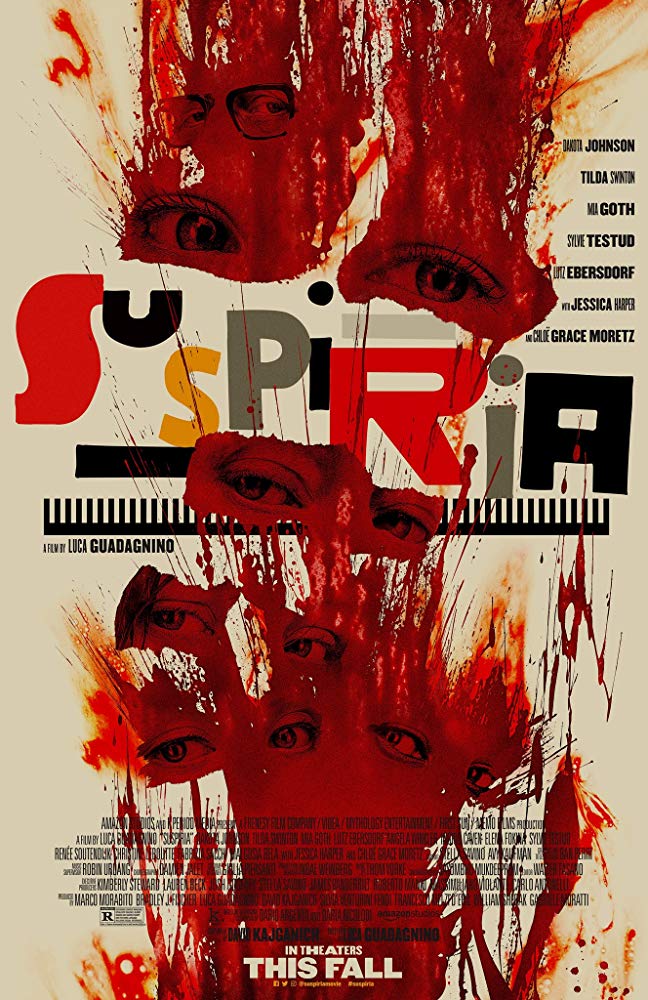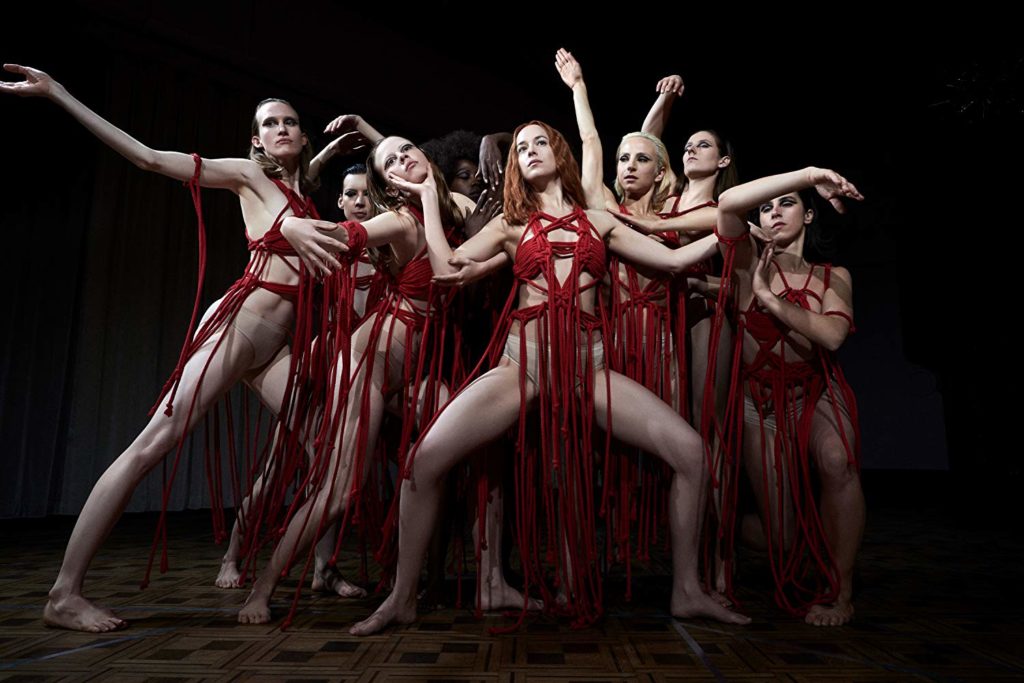Suspiria, the stylish art-horror film, directed by Luca Guadagnino (Call Me By Your Name) and starring Tilda Swinton, Dakota Johnson, and Jessica Walters, world premiered (in competition) at the 2018 Venice Film Fest.

Teaming Again with Director Luca
Dakota Johnson: It’s kind of a no-brainer all of the time. So no matter what it is, I would do anything with Luca. And if anything was awful during the process I would tell him, but I don’t think that that would ever happen.
Hard Movie to Make?
DJ: No. It was a pleasure to shoot, it was a joy actually, it was fun.
Shooting Locale
DJ: We were shooting in Varese, which is in the North of Italy, about an hour North of Milan, up on the top of the mountain in an abandoned hotel that we had transformed into the dance academy, which was an insane transformation, stunning, and to see it beforehand and to go into a cave of dance rehearsals and then to come out and have it be this hub, we had one floor that was the hallway of our dressing rooms and then another floor that was set and offices and it was a functioning world and it was amazing. It was contained and we knew where we were going every day and we got very comfortable with the environment and the sets and we really lived there. But we would go home at night and sleep in our beds and then come back.

Dancing in Film
DJ: About 90 percent of the dancing is me. Even the jumps were me. I danced as a child, from five to fifteen, I did ballet and jazz and tap. So the only real background I have is just that I have learned choreography before, which is I think a certain muscle of your brain. And then working and training for the dancing. For six months, I was working with someone on my body, and then a month prior was working with Damien and the other dancers in Varese every day, for like six to eight hours. So it was three or four hours of choreography and getting it right and then a break and then again. I worked very closely with a dancer named Tanya, who was, if there was anything that my body couldn’t do or we needed to make it look extraordinary, she would be my double. We worked with each other in a way that we could find a medium with the movements so that we could match each other perfectly.
Instructors like the One Tilda Swinton Played in the Film?
DJ: Definitely. I haven’t had that, but you always sort of, there’s so many stories about sort of master and then the chosen student, the chosen one, the sort of master-muse situation. I haven’t personally had that. It’s a very mystical relationship, doesn’t it seem that way?
Power of Women
DJ: It speaks about some pretty substantial concepts, which are the power of women, but the number of women that exist in a singular woman. This collective consciousness, in this film, there’s 40 women in the cast, and in each of the women, there’s a million women. And I find that in myself. I feel ten thousand different ways every other day. I think for a long time, it’s been that women have to be stable and subdued and polite and sweet and charming and sexy, but not too sexy, and it’s like, why can’t I be everything and why can’t everybody be everything, as long as you are not hurting anybody else. I think that this film includes very dark subject matter because of the anger of the times and the political situation.
German Element
DJ: Berlin in the 1970s was to my knowledge an explosive time for women. Women were angry and aggressive and women like Mary Wigman were speaking out through their art. But also Mary Wigman was in Germany at that time speaking out through the dancing. She was a choreographer, who was very much a reference for us. And she was very outspoken without speaking.
Mother/Mothers in the Film
DJ: It’s really interesting, I think it can be interpreted many different ways and all of them are correct. That’s kind of the thing about this idea of a matriarch that is not one thing. I think that there is a relationship, or there have been relationships between spawn and mother that are convoluted or tricky or abusive or emotionally complicated. And it’s not wrong, see, the mother Suspiria in this film is all encompassing every emotion, every woman. And she is so in touch with all of her energy, with her power, with the universe, with people that she, in a magical sense, has this actual magic, this actual power over people and the ability to keep you alive or kill you and the ability to erase your memory or destroy your life or make it heaven.
Original 1977 Film
DJ: I watched the original, which is very different. The aesthetic of our film is very different from that of the original. The plot is more internal and I feel in the original it follows a storyline and it’s more of external happenings.
Freud’s Impact
And you see, Susie’s journey in this film is an internal journey and she evolves and she has this connection to this thing. Luca and I talked a lot about Freud’s analysis of the uncanny, when it’s basically, when something is strangely familiar, when it’s déjà-vu or a doppelganger. And Susie has this magnet hold to Madame Blanc. There is no reason why, coming from her Mennonite family, to be obsessed with Madame Blanc. It’s the opposite of everything she has grown up in and she is obsessed with Berlin and she just needs to go. She doesn’t have any formal training, she is a vessel, she is meant to do this, she is a powerful being, she is like a God. I think it’s basically saying that a mother is a God.
Mother-Daughter Relationship
DJ: Because you see Susie having a relationship with her mother that is, well we don’t see their relationship, but you can sense that it’s terrible, that her mother hates her because she is not who her mother wants her to be, which is one thing. And then Susie has a relationship with Madame Blanc, who loves her, because she is exactly who she wants. And it’s very interesting and in that way, they sort of adopt each other. And then to become the mother for Susie is I think to become the ultimate. And I think a mother could be a man, could be a woman, it is sort of in our film genderless.
Psychiatrist’s Role in the Film
DJ: I think he just plays the psychiatrist that is tangled up in all this craziness. He wasn’t an actor, he was actually a real psychiatrist.
Premiering in Venice
DJ: It was amazing. I have been very nervous, I think we have all been a little bit curious as to how the film would be received and the reaction. I think it went so well and to have the reception be as it was, I felt the relief from Luca and it made me feel so proud of him and proud of myself and I can’t believe we did this and we made it and it was such a passion project for everyone, especially for Tilda and Luca. But for me it was as well, and I think that we are just really thrilled.
Learning about Herself
DJ: I learn so much about myself on every project. I think I have just evolved and grown and learned so much about the world and women. What I have learned really is this sense that I think a lot of women and young girls, are living with this outdated feeling that they must compete with other women. That is not a concept in our film, it’s not about skill. I learned that working with 40 women, from all age ranges and from all corners of the world and we were all so happy to be with each other all of the time and I would like to perpetuate that and make films with women, with female filmmakers. I have learned that it’s really important to keep propelling that idea forward and parity is important and there should be no other difference.
Film’s Different Meanings
DJ: If a film can reach each person differently and specifically, then I think it did an amazing job.




Speak Your Mind